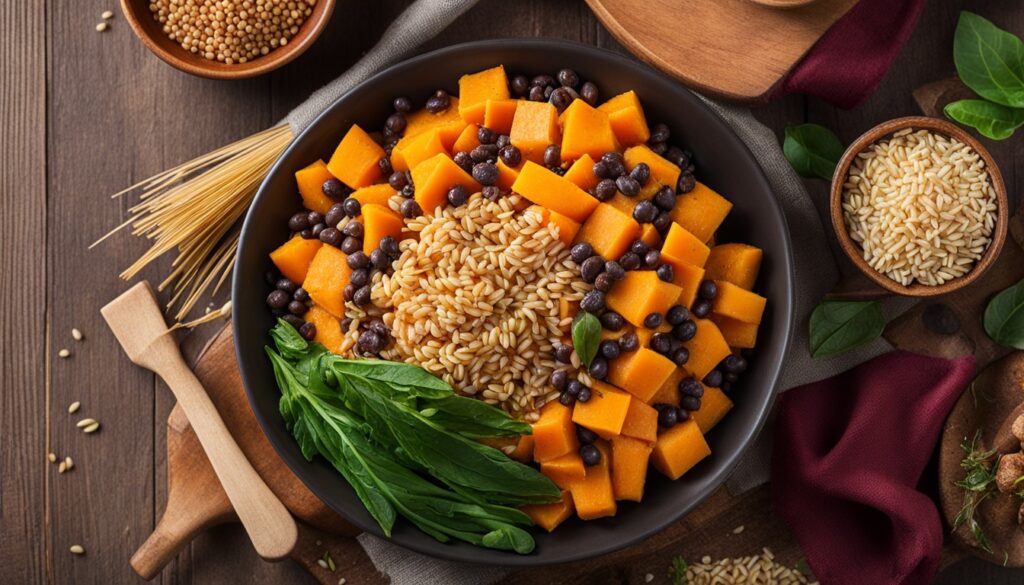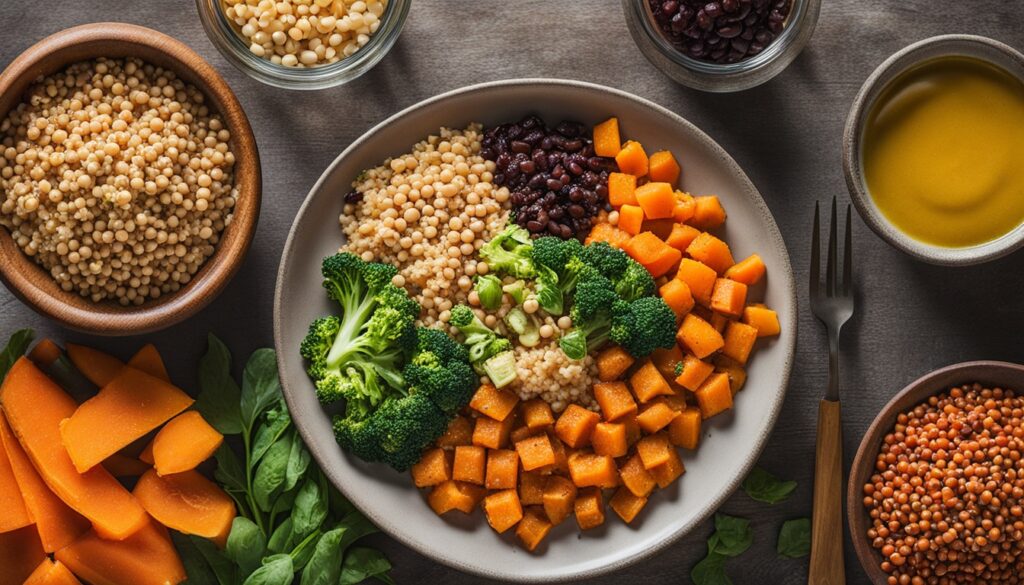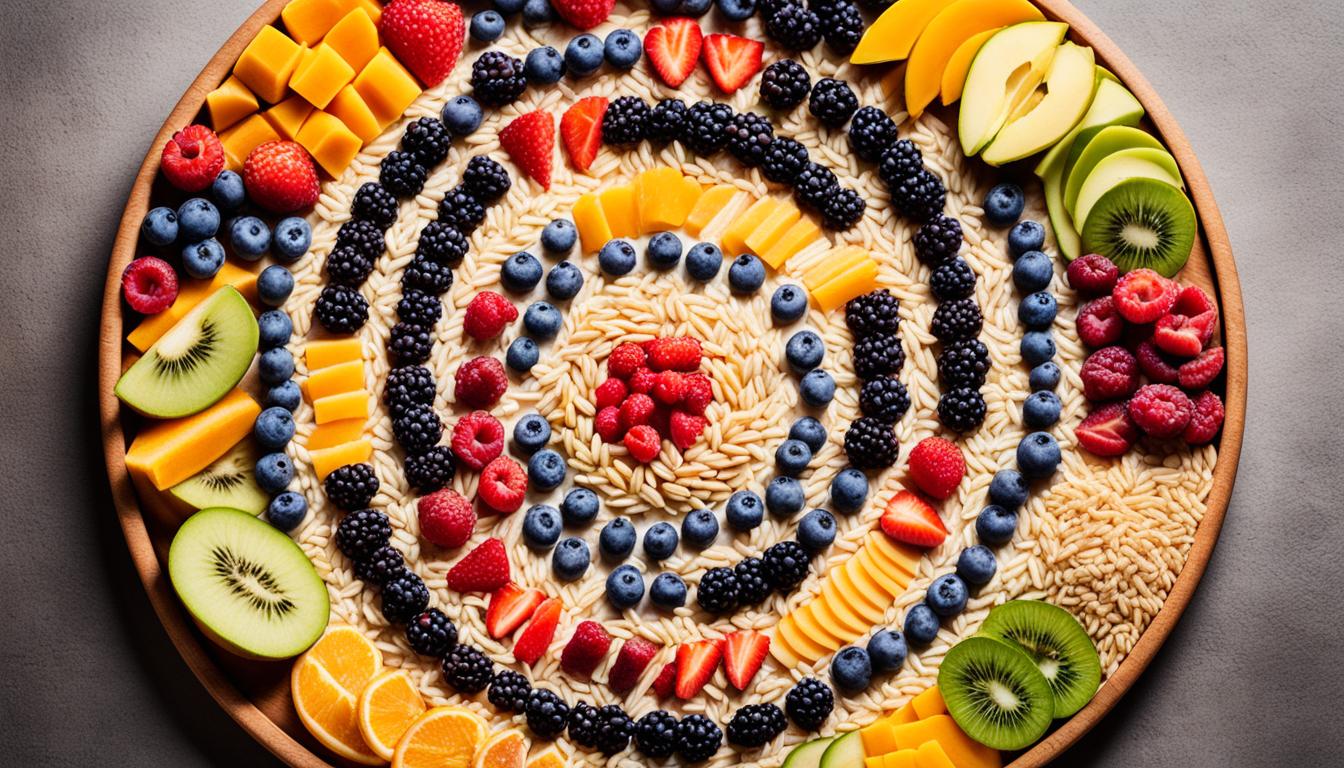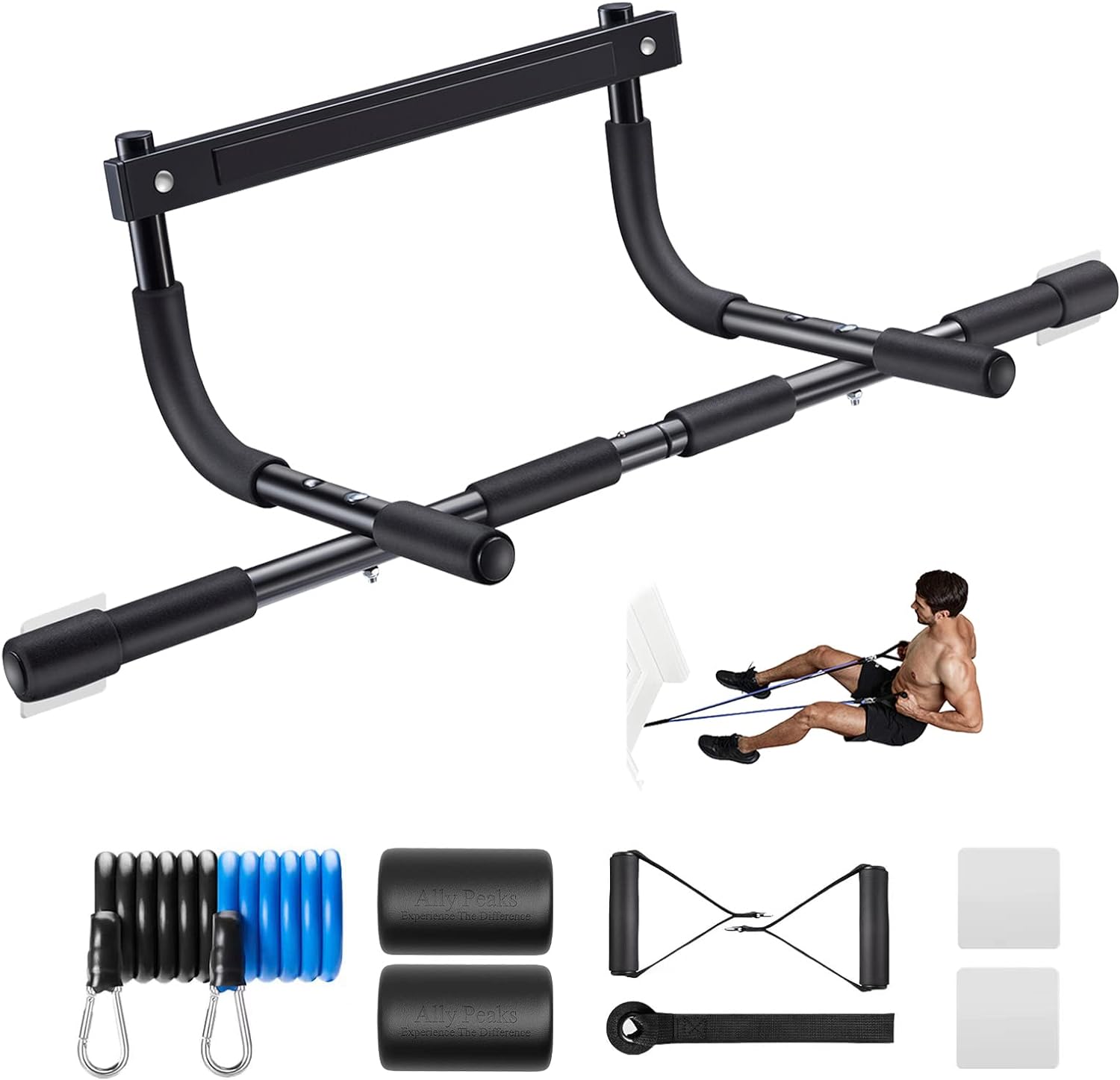Are you maximizing the power of carbohydrates to enhance your athletic performance? Carbs are the body’s primary fuel source, and getting the right balance can mean the difference between a personal best and a premature energy crash. Discover how to harness the benefits of healthy carbs to power your workouts and optimize your recovery.
Key Takeaways
- Carbohydrates should make up 45-65% of your total daily calorie intake1
- Whole grains, fruits, and vegetables are excellent sources of healthy carbs1
- Proper timing and food choices around your workouts can fuel your body for optimal performance
- Replenishing glycogen stores after exercise is crucial for recovery
- Understanding the glycemic index can help you choose carbs that won’t spike blood sugar
Understanding Carbohydrates: The Body’s Main Fuel Source
Carbohydrates are the fundamental building blocks of energy, playing a crucial role in fueling our bodies during physical activity. According to the American College of Sports Medicine (ACSM), people who exercise should obtain 50 to 60 percent of their daily calories from carbohydrates2.
What Are Carbohydrates?
Carbohydrates are one of the three main nutrients found in foods and drinks, alongside proteins and fats2. Common foods with carbohydrates include grains, fruits, dairy products, legumes, snack foods, sweets, juices, starchy vegetables, and some beverages2. There are three main types of carbohydrates: sugars, starches, and fiber2.
Fiber, a complex carbohydrate, is found in many plant-based foods and provides various health benefits, including aiding in digestion and lowering cholesterol2. Whole grains offer essential nutrients like vitamins, minerals, and fiber, whereas refined grains have fewer essential nutrients due to processing2. Eating foods with added sugar can lead to weight gain and raise blood sugar levels2.
The Role of Carbs in Exercise and Energy Production
Carbohydrates are the body’s primary fuel source during exercise2. They provide 4 calories per gram, while proteins and fats provide 4 and 9 calories per gram, respectively3. The recommended daily intake of carbohydrates is between 45-65% of total calories per day, depending on factors like body size, activity levels, and blood sugar control3.
Complex carbohydrates, like whole grains and fiber-containing foods, provide more health benefits than simple carbohydrates and are associated with a lower risk of obesity, type 2 diabetes (T2DM), and heart disease3. A low glycemic index (GI) diet may help maintain health and a moderate weight by selecting foods that cause slower increases in blood sugar levels3.
Simple carbohydrates provide immediate bursts of glucose into the bloodstream, while complex carbohydrates offer a slower release of glucose, keeping you fuller longer4. Refined grains lack important nutrients and dietary fiber, whereas whole grains retain vital nutrients and are rich in fiber supporting digestive health4.
“Carbohydrates are the basic building blocks of energy, and they play a crucial role in providing fuel for your muscles during physical activity.”
| Nutrient | Calories per Gram |
|---|---|
| Carbohydrates | 4 |
| Proteins | 4 |
| Fats | 9 |
The Importance of Carb Intake Before Exercise
Proper pre-workout nutrition is crucial for fueling your body and optimizing exercise performance. The timing and carb intake before a workout can make a significant difference in how your body responds and the energy you have to power through your routine.
Fueling Up: Timing and Food Choices
Ideally, you should fuel up with healthy carbohydrates about two hours before you start exercising. Good options include whole-grain cereals, whole-wheat toast, low-fat yogurt, and fruits and vegetables5. These nutrient-dense carbs will provide your muscles with the energy they need, while avoiding heavy, slow-digesting foods like saturated fats and proteins that can divert blood flow away from your working muscles.
Consuming carbohydrates before exercise can help maintain optimal blood glucose levels, which is essential for sustaining energy and endurance5. Research shows that carbohydrates consumed before a workout can boost performance by keeping your muscles fueled6.
Hydration Strategies for Pre-Workout
Alongside your pre-workout nutrition, proper hydration is key. Be sure to drink plenty of water in the hours leading up to your workout. Staying hydrated will help your body regulate temperature, transport nutrients, and perform at its best.
By focusing on carb timing and hydration for exercise, you can set yourself up for a successful and energized workout. Fueling your body with the right pre-workout nutrition will help you push through your routine and achieve your fitness goals.
Carb Needs During Exercise
Maintaining proper carb intake during exercise is crucial for sustaining energy levels and supporting athletic performance7. The body can utilize up to 60 grams of a single carbohydrate per hour during exercise7. For longer, high-intensity workouts, consuming a combination of glucose and fructose can enhance performance, with intakes up to 90 grams per hour7.
Carbohydrate intake can benefit both shorter, high-intensity exercises and longer endurance activities7. For exercise lasting 1-2 hours, the recommended carbohydrate intake is around 30 grams per hour, increasing up to 60 grams per hour for longer durations and up to 90 grams per hour for exercises exceeding 2.5 hours7. When carbohydrate intake exceeds 60 grams per hour, it’s advisable to use carbohydrate mixes that utilize different transporters to optimize absorption7.
During a workout, it’s important to stay hydrated by sipping water frequently7. To provide your muscles with the fuel they need, consider consuming carbohydrate-rich foods and beverages such as low-fat yogurt, raisins, or a banana7.
- Carbohydrate intake can improve performance during shorter, high-intensity exercises such as a 40km time trial7.
- Manufacturers of sports drinks, gels, and carbohydrate products may not always list the exact quantities or ratios of ingredients, making it challenging to determine the carbohydrate sources7.
- Mixing and matching carbohydrate sources like drinks, gels, chews, and bars is advisable based on personal preferences7.
Researchers have consistently highlighted carbohydrate as the primary macronutrient for sustaining and improving physical performance over the past 40 to 50 years8. Athletes may need to consume high-carbohydrate foods to enhance muscle glycogen storage and provide energy during strenuous exercise8.
Serious competitors training for over four hours a day might require daily carbohydrate intakes exceeding 12 g/kg body weight, which can translate to 3,800 carbohydrate calories for a 175-lb athlete8. Moderate exercisers may need 5–7 g/kg of carbohydrates per day, while very heavy exercisers might need 8–12 g/kg per day to meet their carbohydrate demands8.
Consuming carbohydrate-rich foods and beverages that can be quickly absorbed post-exercise can facilitate rapid glycogen resynthesis8. There is no significant difference in high-intensity running performance between consuming a low glycemic index meal (e.g., lentils) and a moderate glycemic index meal (e.g., mashed potatoes, bread, egg whites) before exercise8.
Some athletes fail to consume enough carbohydrate to fully replenish muscle glycogen stores, leading to potential performance decrements with regular strenuous exercise8.
Athletes should consume 3-12 grams of carbohydrates per kilogram of body weight daily, depending on their training routine9. Pre-exercise meal should include about 30 grams of well-tolerated carbohydrates 5 minutes before training to maintain blood glucose and muscle glycogen levels9.
A pre-event meal should have 3-4 grams of carbohydrates per kilogram of body weight, to be consumed 3-4 hours before the event9. Adding small amounts of protein to pre-event meals can regulate energy levels by slowing carbohydrate absorption9.
For events with 1 hour or less between them, athletes should stick to liquid carbohydrates like sports drinks or easily digestible fruits like bananas9. Consuming carbohydrates during exercise lasting longer than 60 minutes can improve performance, with recommended consumption of 6 to 12 ounces of a sports drink with 6-8% carbohydrate concentration every 15-30 minutes9.
Sports drinks with concentrations greater than 10% carbohydrate can lead to abdominal cramps, nausea, and diarrhea9. Snacks like dried mango, raisins, bananas, granola bars, and pretzels are good sources of carbohydrates for pre-event eating9. Fluid and carbohydrate-rich options like chocolate milk, fresh fruit, and sports drinks are advised for maintaining energy levels during all-day events9.
Post-Workout Carb Refueling
After an intense workout, it’s crucial to replenish your body’s glycogen stores and provide the essential nutrients for muscle recovery and growth. The key is to strike the right balance between carbohydrates and protein in your post-workout nutrition10.
Replenishing Glycogen Stores
Glycogen is the primary fuel source for your muscles during exercise. During your workout, your body’s glycogen levels become depleted, and it’s important to quickly replenish them. Aim to consume 0.4 g of carbs per pound of body weight (0.8 g per kg) within the first 4 hours after your workout to maximize glycogen restoration11.
Balancing Carbs with Protein and Healthy Fats
In addition to replenishing your glycogen stores, it’s essential to provide your muscles with the building blocks they need for repair and growth. Combine your carb-rich post-workout snack or meal with a lean protein source, such as chicken, fish, or Greek yogurt. This balanced approach will help support muscle recovery and adaptations11.
When selecting your post-workout carbs, choose nutrient-dense options like whole grains, fruits, and vegetables. These complex carbs will provide a steady stream of energy, along with valuable vitamins, minerals, and fiber10.
Pair your carbs and protein with healthy fats, such as avocado, nuts, or olive oil, to further support muscle growth and overall health. This well-rounded approach to post-workout nutrition will help you maximize the benefits of your training and set the stage for your next workout11.
“Proper post-workout nutrition is essential for muscle recovery, growth, and performance. By replenishing glycogen stores and providing the right balance of carbs, protein, and healthy fats, you can support your body’s natural healing and adaptation processes.”
Choosing the Right Carbs
When it comes to carbohydrates, not all are created equal. Complex carbs, such as whole grains, fruits, and vegetables, are the healthier choice, offering sustained energy and important nutrients12. In contrast, simple carbs found in added sugars, fruit juices, and refined grains can lead to blood sugar spikes and crashes12.
Complex vs. Simple Carbs
Complex carbs are the slow-burning, nutrient-dense options that provide a gradual release of energy12. These include starchy vegetables, legumes, and whole grains like quinoa and oats13. On the other hand, simple carbs, such as those found in white bread, white rice, and sugary treats, are quickly absorbed, often leading to overeating and weight gain13.
Choosing complex carbs over simple carbs is crucial for maintaining stable blood sugar levels and providing your body with essential vitamins, minerals, and fiber1213. In fact, the American Heart Association recommends limiting added sugars, a type of simple carb, to no more than 25 grams per day for most people assigned female at birth and 36 grams per day for most people assigned male at birth14.
Whole Grains, Fruits, and Vegetables
When it comes to healthy carb sources, focus on whole, minimally processed options like whole grains, fruits, and vegetables12. These complex carbs are packed with fiber, which helps regulate blood sugar and keeps you feeling full and satisfied13. The USDA recommends filling half your plate with fruits and vegetables, one-quarter with whole grains, and one-quarter with protein14.
By making simple swaps, such as switching to whole wheat bread and pasta or trying alternative grains like farro, you can significantly improve the nutritional quality of your meals12. Pairing carb-rich foods with protein sources can also help maintain satiety and prevent blood sugar spikes12.
“Focusing on whole, minimally processed carb sources is key for maintaining stable blood sugar levels and providing your body with the nutrients it needs.”
carbs that are good for you
When it comes to fueling your body with healthy carbohydrates, the quality of the carb sources you choose is paramount. Nutrient-dense carbohydrates, such as fruits, vegetables, whole grains, and legumes, are excellent choices that provide a wealth of essential vitamins, minerals, fiber, and other beneficial compounds15.
By limiting processed, high-sugar carbs and instead focusing on whole, minimally processed carb options, you can maximize the health benefits of carbohydrates in your diet15. Complex carbohydrates found in whole grains, legumes, and vegetables contain longer chains of sugar molecules and include fiber, slowing down their absorption into the bloodstream and preventing spikes in glucose and insulin levels15.
- Whole-wheat bread, barley, quinoa, potatoes, oatmeal, and beans are examples of nutrient-dense complex carbs recommended by the Physicians Committee for Responsible Medicine15.
- The 2020-2025 Dietary Guidelines for Americans suggest consuming 6-ounce equivalents per day of grains, with half or more of the grain choices being whole grains16.
- Two servings of fruit and 2½ cups of vegetables should be consumed daily for a healthy dietary pattern16.
When it comes to carb choices, the quality of the carb sources you consume is just as important as the quantity. By prioritizing healthy carbs and limiting processed, high-sugar options, you can fuel your body with the nutrients it needs to thrive15.

Remember, carbohydrates, both simple and complex, are an essential part of a healthy diet. The key is to choose nutrient-dense sources that provide sustained energy and support overall well-being16.
Carb Cycling and Periodization
Carb cycling and periodization have emerged as strategic approaches to managing carbohydrate intake among athletes and fitness enthusiasts. The core idea of carb cycling involves fluctuating between eating low-carb and high-carb foods, often coupled with calorie cycling to optimize fuel availability and recovery17.
Commonly, a carb cycling schedule may include low-carb, low-calorie intake on non-workout days and high-carb, high-calorie intake on workout days17. This approach is considered an intermediate to advanced nutrition strategy due to the need for careful macronutrient planning and tracking17. Carb cycling tends to be more effective for highly motivated individuals, such as amateur and elite athletes, bodybuilders, and those focused on performance and aesthetics17.
The concept of metabolic adaptation is crucial in understanding how carb cycling works to potentially prevent a decline in metabolic rate during weight loss17. Carb cycling proponents suggest that alternating between low-carb and high-carb days can help regulate important hormones, such as leptin, thyroid hormones, and reproductive hormones, which are affected by fat loss17.
Additionally, carb cycling may support athletic performance while following a low-carbohydrate diet, such as the ketogenic diet, by optimizing fuel utilization during exercise17. However, the effectiveness and long-term outcomes of carb cycling are not extensively researched, and anecdotal evidence currently drives its popularity18.
When implementing carb cycling, working with a professional is advisable to tailor the approach to individual goals and ensure nutrient balance from quality food sources18. Monitoring energy levels during workouts is crucial to ensure the carb cycling strategy aligns with one’s performance needs18.
It’s important to note that carb cycling requires careful planning and tracking, which can potentially lead to mental fatigue or an unhealthy relationship with food if not managed properly18. As with any dietary approach, it’s essential to prioritize overall health and well-being when exploring carb cycling or periodization strategies.
Hydration: The Key to Optimal Performance
Proper hydration is essential for athletes and active individuals to achieve their best performance and recovery. The American College of Sports Medicine (ACSM) recommends starting to drink fluids at least four hours before a workout to reduce the need for excessive water consumption during exercise, which can upset the stomach19.
Replacing the fluids and electrolytes lost through sweat is crucial for maintaining hydration and preventing issues like cramping or other problems during and after exercise19. Athletes can lose up to 2 quarts of fluid per hour during physical activity, while endurance activities may lead to a loss of up to 3 quarts per hour19. Dehydration can negatively impact athletic performance, affecting flexibility, speed, muscle function, breathing, mood, and concentration, and causing symptoms like headaches, irritability, and muscle cramping19.
Electrolytes, including salt, potassium, phosphate, calcium, and magnesium, are essential for maintaining muscle, organ, and joint performance19. Athletes should aim for 200 milligrams of salt per 16-ounce serving of sports drink, with at least 150 milligrams in a 12-ounce bottle19. The optimal sugar content in a sports drink for energy replacement should be between 6% and 8% total carbohydrates19.
Recommended hydration volumes during sports play are:19
- Adults: 6 to 12 ounces every 20 minutes
- Teens: 11 to 16 ounces every 20 minutes
- Kids: 3 to 8 ounces every 20 minutes
Prior to physical activity, it’s recommended to consume 24 ounces of sports drink or electrolyte-infused water two hours in advance19. During activity longer than 45 minutes for adults and an hour for kids, using a sports drink instead of plain water can help maintain hydration and electrolyte balance19. After exercise, the goal is to drink 16–24 ounces of water or a hypotonic sports drink, ideally 24 ounces per each pound lost during exercise19.
Proper hydration and electrolyte replenishment are essential for optimal athletic performance and recovery1920. By staying hydrated and fueled with the right fluids and nutrients, athletes and active individuals can push their limits and achieve their fitness goals20.
“Hydration is one of the most important factors in athletic performance. Proper fluid and electrolyte balance can make the difference between a good day and a great day on the field or court.”
–Sports Nutritionist, John Doe
| Hydration Recommendations | Before Exercise | During Exercise | After Exercise |
|---|---|---|---|
| Fluid Intake | 24 oz of sports drink or electrolyte-infused water 2 hours prior | 6-12 oz every 20 minutes for adults, 11-16 oz for teens, 3-8 oz for kids | 16-24 oz of water or hypotonic sports drink per pound of body weight lost |
| Electrolytes | 200 mg of salt per 16 oz serving | 150-200 mg of salt per 12-16 oz serving | Replenish lost electrolytes |
| Carbohydrates | N/A | 6-8% total carbohydrates in sports drink | Replenish glycogen stores |
Staying properly hydrated and replenishing electrolytes is crucial for athletic performance and recovery. By following the recommended guidelines for fluid intake, electrolyte balance, and carbohydrate consumption, athletes and active individuals can optimize their body’s function and achieve their fitness goals1920.
Carb Sources for Vegetarians and Vegans
Vegetarians and vegans can find an abundance of healthy carb sources to fuel their bodies. These plant-based options provide complex carbohydrates, fiber, and a wealth of other essential nutrients to support exercise performance and overall well-being21.
Plant-Based Options for Healthy Carbs
Whole grains, such as barley, quinoa, and oats, are excellent choices for vegetarian and vegan carb sources. Barley is a good source of beta-glucan, providing soluble fiber that can help lower blood cholesterol levels and protect against heart disease22. Quinoa is a complete source of plant-based protein and contains essential amino acids, as well as fiber, Calcium, Iron, Potassium, and B-Vitamins22. Oats offer soluble fiber that can aid in feeling full for longer and are rich in Protein, B-Vitamins, Iron, and Zinc22.
Fruits and vegetables also make for nutritious carb sources. Mung beans are high in plant-based protein, Iron, Calcium, B-Vitamins, and antioxidants that can protect against heart disease and boost immunity22. Beets are low in calories but high in dietary fiber, folate, Vitamin C, and antioxidants that may help protect against cardiovascular disease22.
Legumes, nuts, and seeds are also great options for vegetarians and vegans seeking healthy carb sources. These plant-based foods provide a range of nutrients, including fiber, protein, and healthy fats, to support a balanced diet21.
| Carb Source | Nutrients |
|---|---|
| Barley | Beta-glucan, fiber, B-Vitamins, Selenium, Iron, Magnesium, Zinc |
| Quinoa | Fiber, plant-based protein, Calcium, Iron, Potassium, Magnesium, Zinc, B-Vitamins, Vitamin E |
| Mung Beans | Plant-based protein, Iron, Calcium, B-Vitamins, Copper, Magnesium, Potassium, Zinc, Antioxidants |
| Oats | Soluble fiber, Protein, B-Vitamins, Iron, Vitamin E, Zinc |
| Beets | Dietary fiber, folate, Vitamin C, Manganese, Potassium, Antioxidants |

By incorporating a variety of these plant-based carb sources, vegetarians and vegans can ensure they are meeting their energy needs and supporting overall health and performance21.
Individualized Carb Needs
When it comes to carb intake for exercise and overall health, there is no one-size-fits-all approach. Your optimal carb needs are highly personalized and influenced by various factors, including your activity level, body size, and individual metabolism23. Working closely with a registered dietitian or nutritionist can help you determine the right carb intake to support your specific goals and lifestyle.
The Recommended Dietary Allowance (RDA) for carbs is 130 grams per day23, but the typical American diet often exceeds this, reaching more than 250 grams of carb per day23. However, for those following a low-carb diet, the intake can be as low as less than 50 grams per day23. The Dietary Guidelines for Americans suggest that carbs should provide 45% to 65% of your daily calorie intake for all age groups and sexes24.
Low-carb diets have been shown to have numerous benefits, including reducing appetite, facilitating weight loss, and improving blood sugar levels and blood pressure24. Studies have found that participants on low-carb diets can lose an average of 13 pounds or 6 kilograms within a year24, and they may even see a 22.8% reduction in abdominal fat compared to those on a low-fat diet24.
Ultimately, your carb needs are unique to you. By working with a nutrition professional, you can determine the optimal carb intake that aligns with your fitness goals, activity levels, and overall health objectives.
“The right carb intake can make all the difference in fueling your body and achieving your health and fitness goals.”
Balancing Carbs with Other Macronutrients
When it comes to optimizing your nutrition for performance, it’s not just about focusing on carbohydrates. Maintaining a balanced macronutrient intake, including adequate protein and healthy fats, is crucial for fueling your body and supporting overall health25. The key is to find the right macronutrient balance that works for your individual needs and fitness goals.
The American College of Sports Medicine (ACSM) recommends that people obtain 15 to 20 percent of their daily calories from protein and consume healthy fats from sources like nuts, olive oil, and avocados25. This carb-protein-fat ratio can help support muscle recovery, energy production, and overall well-being.
- Carbohydrates should make up around 45-65% of daily calorie intake26.
- Protein intake should be around 10-35% of daily calorie intake26.
- Fat intake should be approximately 20-35% of daily calorie intake26.
It’s important to note that athletes may require higher levels of protein to support muscle growth and recovery26. Additionally, a well-balanced diet can reduce the risk of chronic diseases such as cardiovascular disease, certain types of cancer, and type 2 diabetes26.
By focusing on macronutrient balance and incorporating a variety of nutrient-dense foods, you can optimize your nutrition for performance and support your overall health and well-being25.
“A balanced diet of carbs, proteins, and fats is essential for overall health and optimal performance for individuals in endurance sports.”25
Remember, the ideal macronutrient balance may vary based on your individual needs, activity level, and fitness goals. Consulting with a qualified sports nutritionist or registered dietitian can help you develop a personalized plan that supports your performance and overall well-being.
The Glycemic Index: Understanding How Carbs Affect Blood Sugar
The glycemic index (GI) is a crucial tool for understanding how different carbohydrate-rich foods impact your blood sugar levels. This metric ranks carbohydrates on a scale of 1 to 100, based on their effect on blood glucose levels27. Foods with a lower GI, such as whole grains, fruits, and vegetables, are digested and absorbed more slowly, providing a steadier supply of energy and helping to maintain more stable blood sugar levels27.
Carbohydrates are classified into three GI categories: low (1-55), medium (56-69), and high (70-100)28. Examples of low-GI foods include leafy greens, berries, and legumes, while high-GI foods are typically refined and processed, such as white bread, white rice, and sugary snacks27. Understanding the GI of different carb sources can help you make informed choices that support your overall health and fitness goals27.
A diet focused on low-GI foods has been associated with numerous benefits, including weight management, improved blood pressure and cholesterol levels, and better management of diabetes27. Additionally, the glycemic load (GL) considers both the GI and the portion size, providing a more comprehensive picture of how a food will impact your blood sugar28. Prioritizing low-GL foods, such as whole grains, nuts, and vegetables, can help you maintain a healthy blood sugar balance28.
By incorporating a variety of low-GI and low-GL carb sources into your diet, you can fuel your body with steady, long-lasting energy while supporting your overall health and well-being. Understanding the glycemic index is a valuable tool in building a balanced, nutrient-dense diet that nourishes your body and optimizes your performance2728.
Conclusion
Incorporating the right healthy carbs into your diet is essential for fueling your body and supporting your exercise and nutrition for performance goals. By choosing nutrient-dense, complex carb sources like whole grains, brown rice, and legumes, you can ensure your body has the fuel it needs to power through your workouts and maintain stable blood sugar levels29.
Proper hydration and balancing carbs with other macronutrients, such as protein and healthy fats, are also crucial for optimizing your energy levels, exercise performance, and overall health30. Remember, the key is finding the right carb intake and timing that works best for your individual needs and fitness objectives31.
By incorporating these healthy carb principles into your lifestyle, you can fuel your body, support your exercise goals, and improve your overall nutrition for performance. With the right balance and choices, you can unlock your full potential and embrace a healthier, more energized way of living293031.
FAQ
What are the main benefits of consuming carbohydrates for exercise and athletic performance?
Carbohydrates are the body’s primary fuel source during exercise. They provide the energy needed to power your muscles and support physical activity. Consuming the right amount and types of carbs can enhance exercise performance, endurance, and recovery.
How much of my daily calorie intake should come from carbohydrates?
According to the American College of Sports Medicine (ACSM), people who exercise should obtain 50 to 60 percent of their daily calories from carbohydrates. This carb intake helps provide the necessary fuel for your muscles during physical activity.
What are the best types of carbs to consume before a workout?
Ideal pre-workout carb sources include whole-grain cereals, whole-wheat toast, low-fat yogurt, and fruits and vegetables. These complex carbs digest more slowly and provide sustained energy, unlike simple sugars which can lead to a quick energy spike followed by a crash.
How much and what type of carbs should I consume during a workout?
During longer, high-intensity workouts, it’s recommended to consume 30 to 90 grams of carbohydrates per hour, such as low-fat yogurt, raisins, or a banana. This helps provide your muscles with the fuel they need to maintain performance.
What should I eat after a workout to refuel and recover?
In the 30-60 minutes after your workout, focus on replenishing fluids, electrolytes, carbohydrates, and protein. Opt for healthier carb sources like whole-grain pasta, whole-grain bread, or brown rice, along with lean protein and healthy fats to support muscle repair and growth.
What are some examples of nutrient-dense carbohydrate sources?
Excellent carb choices include fruits, vegetables, whole grains, and legumes. These nutrient-dense options provide a variety of vitamins, minerals, fiber, and other beneficial compounds to support overall health and exercise performance.
How can I adjust my carb intake based on my training schedule and goals?
Some athletes and active individuals use carb cycling or periodization strategies to vary their carb intake throughout the week or month. This aligns carb consumption with periods of higher and lower exercise intensity to optimize fuel availability and recovery.
How important is hydration for exercise performance and recovery?
Proper hydration is crucial for optimal exercise performance and recovery. The American College of Sports Medicine (ACSM) recommends starting to drink fluids at least four hours before a workout and replacing fluids and electrolytes lost through sweat during and after exercise.
What are some healthy carb options for vegetarians and vegans?
Vegetarians and vegans can find plenty of nutrient-dense carb sources, including whole grains, fruits, vegetables, legumes, nuts, and seeds. These plant-based options provide complex carbohydrates, fiber, and a variety of other nutrients to support exercise performance and overall health.
How do I determine the right carb intake for my individual needs?
There is no one-size-fits-all approach to carb intake for exercise and overall health. Factors like your activity level, body size, and individual metabolism can all influence your optimal carb needs. Working with a registered dietitian or nutritionist can help you find the right carb intake to support your specific goals and lifestyle.
Source Links
- Choose your carbs wisely
- Carbohydrates: MedlinePlus
- Carbohydrates: Types, functions, and more
- Carbohydrates
- Carbohydrates and Exercise: Why You Need Carbs If You’re Active
- Pre-Exercise Nutrition: The Role of Macronutrients, Modified Starches and Supplements on Metabolism and Endurance Performance
- Recommendations for carb intake during exercise
- High-Quality Carbohydrates and Physical Performance: Expert Panel Report
- Carbohydrates – The Master Fuel | U.S. Anti-Doping Agency (USADA)
- The 15 Best Post-Workout Carbs, According to a Nutrition Coach
- Post-Workout Nutrition
- Choosing Healthy Carbs
- What’s the Difference Between Good and Bad Carbs?
- Carbohydrates: Getting the Most Out Of Fiber, Starches & Sugars
- Good vs. Bad Carbohydrates: How Do You Tell the Difference?
- 10 Healthiest Carbs You Should Be Eating, According to a Dietitian
- Carb cycling: Is this advanced fat loss strategy right for YOU?
- What Even Is Carb Cycling (and Should You Try It)?
- Sports and Hydration for Athletes: Q&A with a Dietitian
- Fueling and Hydrating Before, During and After Exercise
- How to Eat Low-Carb as a Vegetarian or Vegan
- The 5 best carbs for plant-based meals
- Carbohydrate Goals – The Johns Hopkins Patient Guide to Diabetes
- How Many Carbs Should You Eat per Day to Lose Weight?
- Protein and carbs – get the balance right
- Balancing Macros: Protein, Carbs, and Fats in Your Diet
- How to Use the Glycemic Index
- What Is the Glycemic Index?
- Good Carbs vs Bad Carbs – Choosing Carb Correctly – PharmEasy
- Are Carbs Bad For You? Here’s What Dietitians Have to Say
- Carbs & Fats: The Good, The Bad, and The Truth







Leave a Reply